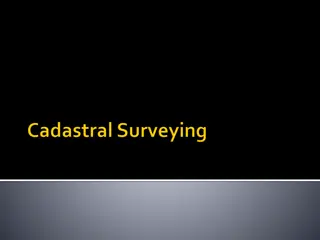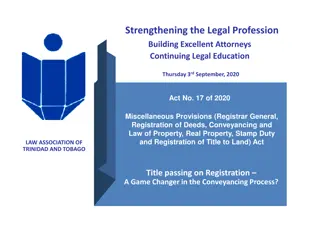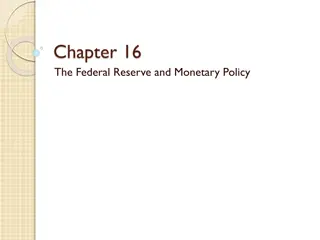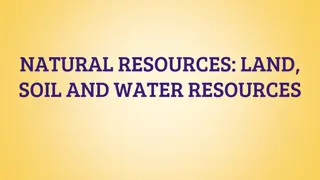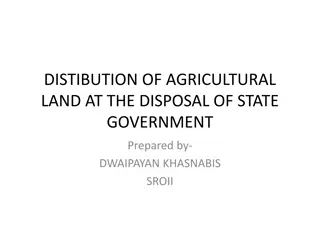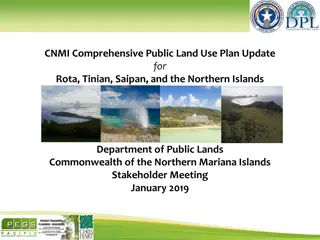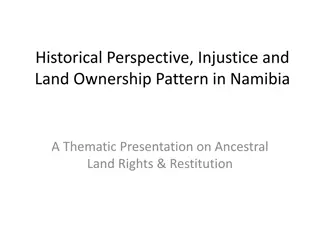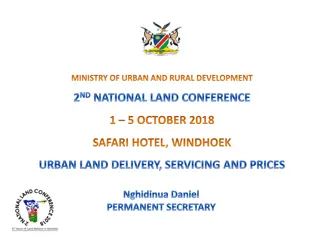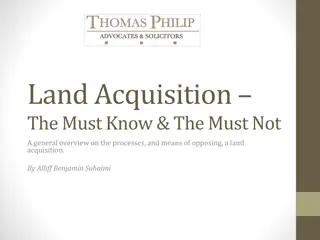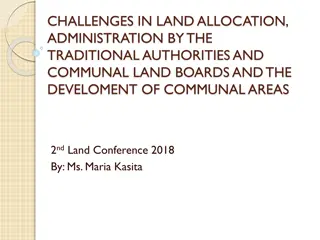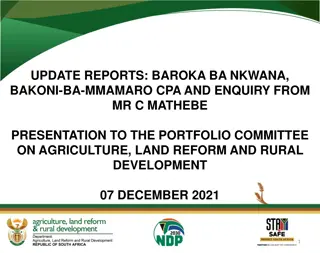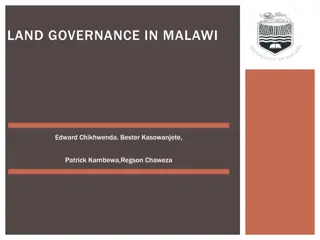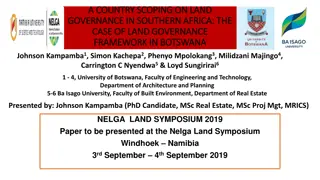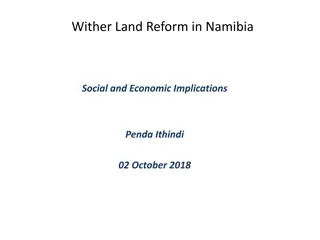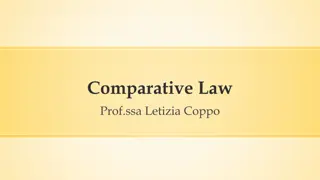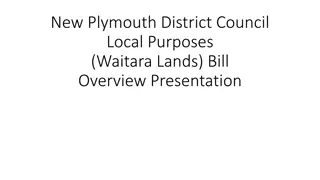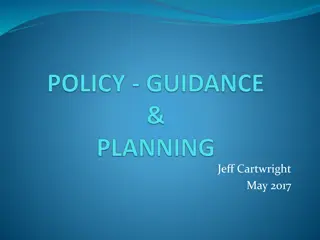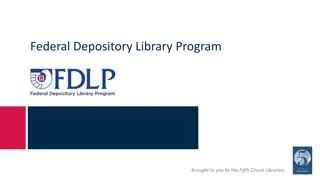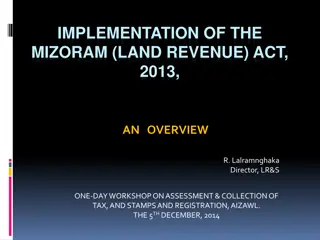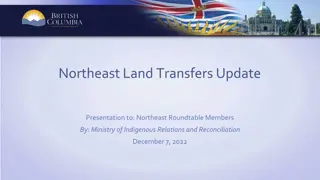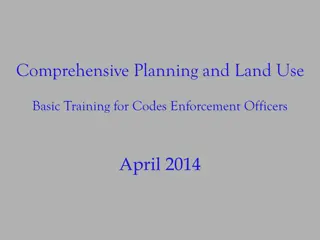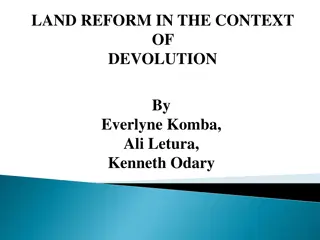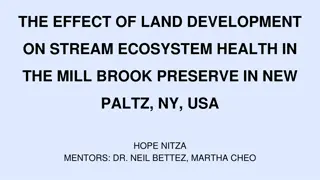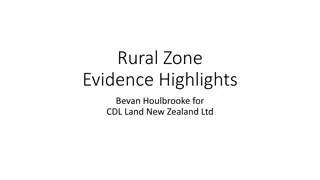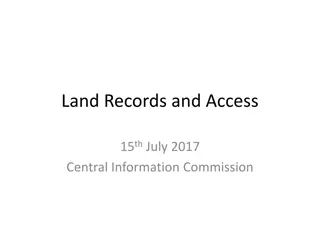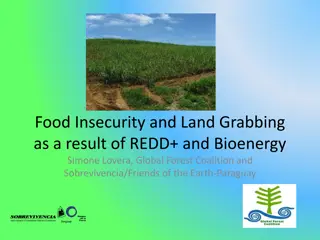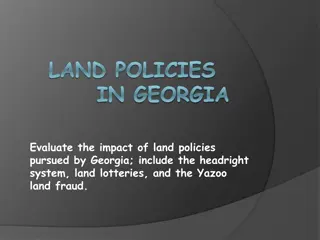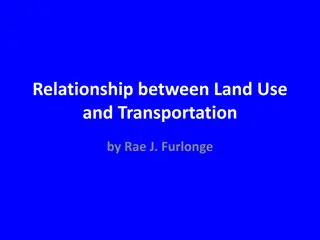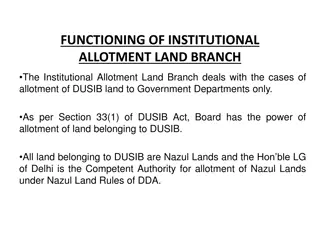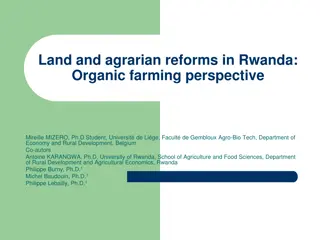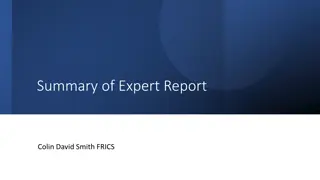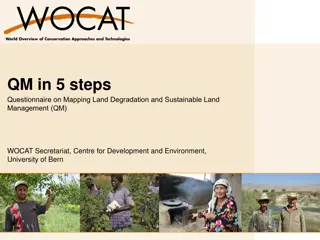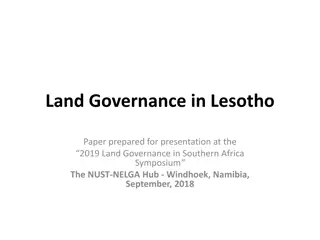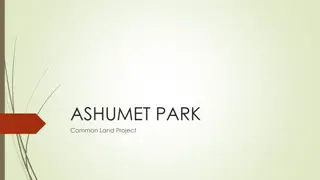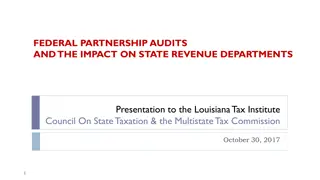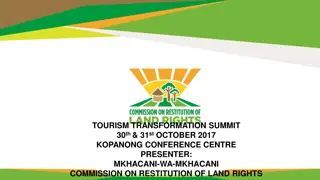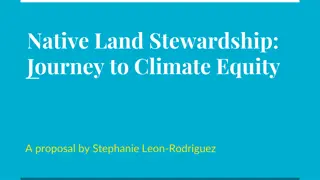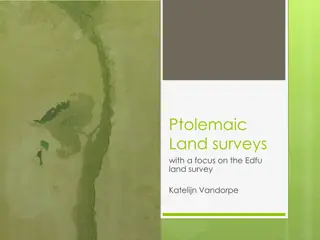Understanding Cadastral Systems in Land Management
Cadastral systems play a crucial role in land management by handling land registration, property taxation, and land tenure. These systems involve private conveyancing, registration of deeds, cadastral surveying, and mapping to maintain records efficiently. They provide information on parcel index ma
1 views • 16 slides
Evolution of Land Law Systems in Trinidad and Tobago
Trinidad and Tobago's land law systems consist of the Common Law System and the Registered Land System. The Common Law system governs unregistered land where title passes upon execution and delivery of the deed. In contrast, the Registered Land System confers ownership upon registration and offers c
0 views • 28 slides
Understanding the Federal Reserve System and Monetary Policy
Delve into the history, structure, and functions of the Federal Reserve System, including its role in implementing monetary policy to stabilize the economy. Explore the establishment of the Federal Reserve Act of 1913, the structure of the Federal Reserve, and its pivotal role in serving the governm
0 views • 35 slides
Understanding Land, Soil, and Water Resources
Natural resources such as land, soil, and water are crucial for human activities. Land comprises the lithosphere and is utilized for various purposes based on land use patterns. The study of land use patterns is essential for economic planning, as the availability of land is limited, leading to conf
5 views • 25 slides
Principles of Agricultural Land Distribution by State Government
The article discusses the distribution of agricultural land at the disposal of the state government in line with the policy objectives outlined in the WBLR Act. It covers the types of agricultural lands available, principles of land distribution, and restrictions on land transfers. Priority is given
0 views • 14 slides
CNMI Public Land Use Plan Update Stakeholder Meeting 2019
The CNMI Comprehensive Public Land Use Plan Update details the key drivers for land selection, recommendations for future land uses on each island, and includes discussions on the project team, schedule of key milestone dates, and the purpose and scope of the plan outreach and participation. The sta
4 views • 29 slides
Namibia's Ancestral Land Rights: Historical Injustice and Restitution
Explore the historical context of land ownership in Namibia, focusing on ancestral land rights, colonization processes, and the impact on indigenous populations. Learn about the notion of ancestral land, who should be considered indigenous, and the colonial modes of land acquisition. Uncover the str
0 views • 33 slides
Challenges and Solutions in Urban Land Delivery and Pricing in Namibia
The Urban Land and Housing Sector in Namibia faces significant challenges such as a backlog in land delivery, high input costs, weak urban planning, and limited institutional capacity. These issues lead to slow supply rates and affordability problems for end users. Addressing these challenges requir
0 views • 20 slides
Understanding Land Acquisition Processes and Means of Opposing
Federal laws in Malaysia allow for land acquisition for public purposes or economic development. The process involves notification to the public, entry and survey marking of land, and award by the Land Administrator. Only persons defined as "interested" under the Land Acquisition Act can raise objec
3 views • 40 slides
Challenges in Land Allocation and Administration by Traditional Authorities and Communal Land Boards
The Communal Land Reform Act of 2002 introduced Communal Land Boards to assist Traditional Authorities in land administration. However, challenges such as misconceptions of powers, limited technical capacity, inadequate resources, and unclear procedures have hindered smooth registration and resoluti
0 views • 15 slides
Update Reports: Baroka Ba Nkwana, Bakoni-Ba-Mmamaro CPA, and Enquiry from Mr. C. Mathebe Presentation to the Portfolio Committee on Agriculture, Land Reform, and Rural Development
This report provides updates to the Portfolio Committee on Agriculture, Land Reform, and Rural Development regarding Mr. Collen Mathebe's matter, Bakoni-Ba-Mmamaro CPA, and Baroka Ba Nkwana Land Claim. Mr. Mathebe's issue cannot be resolved through the Land Title Adjustment Act, and alternative opti
0 views • 38 slides
Land Governance in Malawi: Challenges and Progress
Malawi's land governance system has evolved significantly since the colonial era, with a framework that includes institutional and legal aspects. The country has faced challenges in managing land disputes, valuation, taxation, and public land use. The institutional setup involves the central governm
0 views • 23 slides
Land Governance Framework in Botswana: A Country Scoping Study
Botswana, a landlocked middle-income country in Southern Africa, faces challenges such as high population growth, unemployment, poverty, and a less skilled workforce. This study examines the land governance framework in Botswana, focusing on key challenges in land administration, dispute resolution,
0 views • 15 slides
Implications of Land Reform in Namibia: Social and Economic Insight
Land reform in Namibia is crucial for inclusive growth and shared prosperity, with access to land being a key factor. Productive land usage can lead to wealth creation and social development. The importance of agriculture in the economy is highlighted, along with the need for skilled farmers and a s
0 views • 7 slides
Enhancing Land Degradation Neutrality Targets in Lebanon's National Action Programme
Integrating LDN targets into Lebanon's National Action Programme, led by Dr. Chadi Mohanna, aims to align the NAP with the UNCCD's 10-Year Strategy, set national targets for Land Degradation Neutrality, and implement measures to combat land degradation aggravated by climate change. The project focus
0 views • 23 slides
Understanding the Federal System in American Law
The American legal system is rooted in a division of powers between the States and the Federal government. Federal law fills gaps and complements State laws, with Federal courts having jurisdiction over disputes involving different States or Federal issues. The Constitution and Bill of Rights protec
0 views • 23 slides
Land Management and Funds Allocation in New Plymouth District Council: Overview
This presentation provides an overview of the New Plymouth District Council Local Purposes (Waitara Lands) Bill, detailing the key provisions related to land sales, fund allocation, and the establishment of a Waitara Community Board and a Waitara Hap Land Fund. The bill outlines the distribution of
0 views • 12 slides
Understanding Federal Land Withdrawals: Process and Types
Federal land withdrawals are formal actions that designate land for specific purposes, involving a detailed process and different types based on the authority. The process includes implementing regulations, application procedures, reviews, and approvals. Types of withdrawals include administrative,
0 views • 12 slides
Federal Depository Library Program: Providing Access to Government Information
The Federal Depository Library Program (FDLP) offers free government materials to libraries, ensuring public access to federal information. Established in 1813, the program disseminates resources across 1150 federal libraries, promoting transparency and accountability. Selective depository libraries
0 views • 20 slides
Overview of the Mizoram Land Revenue Act, 2013
The Mizoram Land Revenue Act, 2013 replaced several previous regulations and came into effect on June 1, 2013. It establishes authorities for land management, outlines control and powers over land, and provides guidelines for land allotment for specific purposes. The Act designates the Government of
0 views • 18 slides
Update on Northeast Land Transfers: Presentation to Roundtable Members
Ministry of Indigenous Relations and Reconciliation provided an update on land transfers in Northeastern British Columbia, focusing on Treaty Land Entitlement, stakeholder engagement, and communication methods. The presentation highlighted the historical land debt, final settlement agreements, and t
0 views • 8 slides
Understanding Comprehensive Planning and Land Use for Code Enforcement Officers
Comprehensive Planning involves guiding community growth through the creation of a Comprehensive Plan. Land Use refers to the classification and regulation of how land is utilized. Police Powers allow municipalities to regulate land use to protect public health, safety, and welfare. The regulation o
0 views • 27 slides
Land Reform in the Context of Devolution in Kenya
Kenya, with a land area of 582,646 sq. Km, has undergone land reform in the context of devolution since gaining independence in 1963. The country's adoption of the Constitution in 2010 led to the establishment of a system with 1 national government and 47 devolved governments. Kajiado County, inhabi
0 views • 33 slides
Impact of Land Development on Stream Ecosystem Health in Mill Brook Preserve, NY, USA
The study focuses on the effects of land development on stream ecosystem health in the Mill Brook Preserve in New Paltz, NY. It discusses the degradation of water quality due to surrounding land development and the importance of macroinvertebrates as indicators of ecosystem health. The review of lit
0 views • 23 slides
CDL Land New Zealand Ltd Urban Development Proposal
CDL Land New Zealand Ltd, a land-based investment and development company, seeks to protect the Urban Expansion Area (UEA) from inappropriate subdivision. They aim to aggregate land for a master-planned community, requesting discretion for subdivisions around existing dwellings and future urban deve
0 views • 7 slides
Importance of Land Records in Preventing Land Disputes
Land records play a crucial role in documenting ownership, facilitating land-related transactions, and preventing costly litigation. They serve as a lifeline for effective governance and provide legal status to landowners, ensuring clarity and transparency in land ownership. Without proper land reco
0 views • 15 slides
Understanding Land Use Management and Its Impact on Fertility
Humans have utilized land for various needs over time, evolving from agriculture to encompass municipal, transportation, energy, recreational, and waste management. Land use management is crucial for maintaining soil fertility and preventing erosion and pollution. Factors affecting soil/land fertili
0 views • 10 slides
Impacts of REDD+ and Bioenergy on Food Security and Land Grabbing
The drivers of forest loss, including demand for wood and land, conflict over land tenure, urbanization, industrialization, corruption, and climate change, are explored in relation to food insecurity and land grabbing caused by initiatives like REDD+ and bioenergy. Increasing competition for land be
0 views • 14 slides
Impact of Land Policies in Georgia: Headright System, Land Lotteries, and Yazoo Land Fraud
Georgia pursued various land policies post-Revolutionary War to allocate land obtained from Native Americans. The headright system granted land to soldiers and white men, aiming to boost population and state power. Land lotteries distributed land through random draws. The Yazoo land fraud scandal ta
0 views • 20 slides
Understanding the Relationship Between Land Use and Transportation
The need for land use planning is crucial as land is a finite resource, and its utilization impacts the community. Sustainable transportation aims to increase mobility options while reducing driving. The state plays a vital role in land use activities such as planning, zoning, and infrastructure dev
0 views • 13 slides
Functioning of Institutional Allotment Land Branch - DUSIB
The Institutional Allotment Land Branch manages the allocation of DUSIB land to government departments in Delhi. The Board has the authority to allocate Nazul Lands belonging to DUSIB, with the LG of Delhi being the Competent Authority. Allotments are done based on Circle Rates for lease, with the D
0 views • 8 slides
Land and Agrarian Reforms in Rwanda: Organic Farming Perspective
Land reform policies in Rwanda have been crucial for optimal land resource utilization, conflict resolution, and equity promotion. Since 2004, there have been significant changes focusing on systematic land registration, asset transaction facilitation, and efficiency through specialization. Organic
0 views • 23 slides
Expert Report on Valuation and Land Acquisition for Metropolis Airport
Colin David Smith, FRICS, an experienced professional in property valuation and land acquisition, has prepared an expert report for Metropolis Airport. The report involves the acquisition of land for a new runway and airport expansion. The land in question, part of a larger holding owned by Logipol
0 views • 17 slides
5 Steps Questionnaire on Mapping Land Degradation and Sustainable Land Management
Preparation for mapping land degradation and sustainable land management involves steps such as preparing the base map, identifying contributing specialists, assessing land use systems, understanding land degradation types, and providing expert recommendations. The process includes analyzing area tr
0 views • 32 slides
Land Governance in Lesotho: An Overview
This paper discusses the institutional frameworks, legal frameworks on land tenure, and land registration processes in Lesotho. It covers the roles of central and local government institutions, as well as informal actors like customary chiefs. The legal framework on land tenure, including statutory
0 views • 22 slides
Ashumet Park Common Land Project Overview
The Ashumet Park Common Land Project aims to transform Lot 8 into a multi-use community area in Ashumet Valley. The project includes three phases: Land Survey, Land Clearing, and Grass Installation. Phase 1 involved conducting a land survey, while Phase 2 focused on land clearing by removing trees a
0 views • 7 slides
Understanding Federal Partnership Audits and Their Impact on State Revenue Departments
The presentation discusses the impact of federal partnership audits on state revenue departments, emphasizing how states benefit from federal audit efforts. It covers topics such as reporting federal audit adjustments, the background of federal audit adjustments, and the final determination process.
0 views • 51 slides
Land Reform Mandate and Rural Development Strategies in South Africa
The 1996 Constitution of South Africa outlines the land reform framework, emphasizing equitable access to land for citizens. The 2011 Green Paper on Land Reform emphasizes minimal disruption to agriculture and rural economy transformation. National Development Plan Chapter 6 focuses on rural communi
0 views • 16 slides
Native Land Stewardship: Path to Climate Equity
Stephanie Leon-Rodriguez presents a proposal focused on promoting land back initiatives, including federal support programs like the Land Buy-Back Program for Tribal Nations and conservation easements. State support through initiatives like the Mass Conservation Land Tax Credit Program is also highl
0 views • 13 slides
Ptolemaic Land Surveys: Insights from Edfu Survey and Related Operations
Explore the intricacies of Ptolemaic land surveys, with a focus on the Edfu land survey conducted by Katelijn Vandorpe. Delve into main survey operations such as cadastral surveys and crop reports, discuss nome surveys at village levels, and analyze topographical land surveys highlighting personal d
0 views • 16 slides
